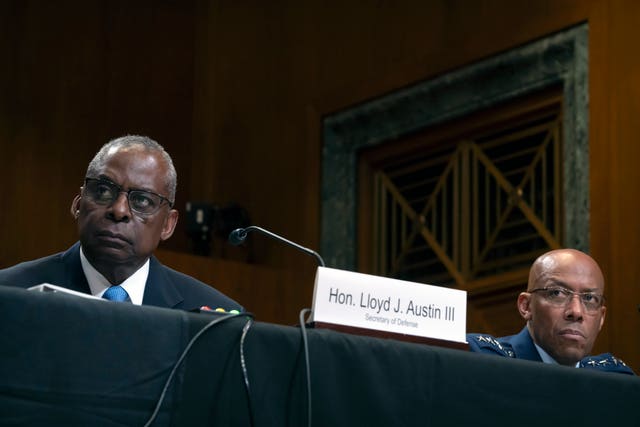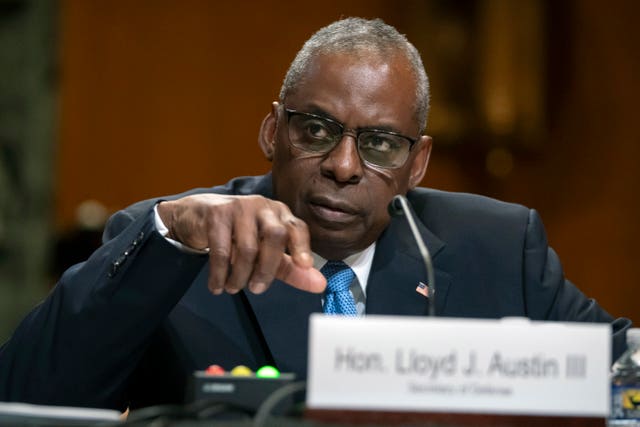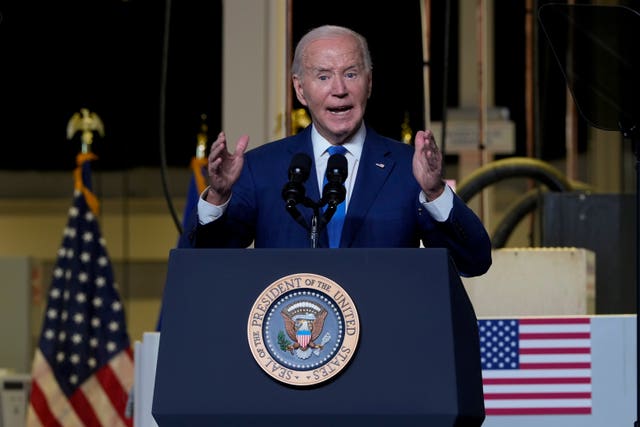Pentagon chief confirms US paused bomb shipment to Israel over Rafah concerns
The move is the most striking manifestation of the growing daylight between Israeli PM Benjamin Netanyahu’s government and Joe Biden’s administration.

The Biden administration paused a shipment of bombs to Israel last week over concerns that the country was approaching a decision on launching a full-scale assault on the southern Gaza city of Rafah against the wishes of the US, defence secretary Lloyd Austin said.
The shipment was supposed to consist of 1,800 2,000lb (900kg) bombs and 1,700 500lb (225kg) bombs, according to the official.
The focus of US concern was the larger explosives and how they could be used in a dense urban setting such as Rafah where more than one million civilians are sheltering after evacuating other parts of Gaza amid Israel’s war on Hamas, which came after the militant group’s deadly attack on Israel on October 7.
“We’re going to continue to do what’s necessary to ensure that Israel has the means to defend itself,” Mr Austin said.
“But that said, we are currently reviewing some near-term security assistance shipments in the context of unfolding events in Rafah.”
The US has historically provided enormous amounts of military aid to Israel.
That has only accelerated in the aftermath of Hamas’s October 7 attack that killed some 1,200 people in Israel and led to about 250 being taken captive by militants.
The pausing of the aid shipment is the most striking manifestation of the growing daylight between Israeli Prime Minister Benjamin Netanyahu’s government and the administration of Democratic President Joe Biden, which has called on Israel to do far more to protect the lives of innocent civilians in Gaza.
It also comes as the Biden administration is due to deliver a first-of-its-kind formal verdict this week on whether the air strikes on Gaza and restrictions on delivery of aid have violated international and US laws designed to spare civilians from the worst horrors of war.
A decision against Israel would further add to pressure on Mr Biden to curb the flow of weapons and money to Israel’s military.

The White House National Security Council sought to keep the decision out of the public eye for several days until it had a better understanding of the scope of Israel’s intensified military operations in Rafah and until Mr Biden could deliver a long-planned speech on Tuesday to mark Holocaust Remembrance Day.
Mr Biden’s administration in April began reviewing future transfers of military assistance as Mr Netanyahu’s government appeared to move closer towards an invasion of Rafah, despite months of opposition from the White House.
The official said the decision to pause the shipment was made last week and no final decision had been made yet on whether to proceed with the shipment at a later date.
US officials had declined for days to comment on the halted transfer, word of which came as Mr Biden on Tuesday described US support for Israel as “ironclad, even when we disagree”.
Press secretary Karine Jean-Pierre declined to square the arms hold-up with Mr Biden’s rhetoric in support of Israel, saying only: “Two things could be true.”
Israel’s ambassador to the United Nations, Gilad Erdan, in an interview with Israeli Channel 12 TV news, said the decision to pause the shipment was “a very disappointing decision, even frustrating”.
He suggested the move stemmed from political pressure on Mr Biden from Congress, the US campus protests and the upcoming election.

“If we stop weapons necessary to destroy the enemies of the state of Israel at a time of great peril, we will pay a price,” said Senator Lindsey Graham (Republican-South Carolina), his voice rising in anger during an exchange with Mr Austin.
“This is obscene. It is absurd. Give Israel what they need to fight the war they can’t afford to lose.”
Independent Senator Bernie Sanders, of Vermont, a Biden ally, said in a statement the pause on big bombs must be a “first step”.
“Our leverage is clear,” Mr Sanders said.
“Over the years, the United States has provided tens of billions of dollars in military aid to Israel. We can no longer be complicit in Netanyahu’s horrific war against the Palestinian people.”
Mr Austin, meanwhile, told legislators that “it’s about having the right kinds of weapons for the task at hand”.

He said the US wants to see Israel do “more precise” operations.
Israeli troops on Tuesday seized control of Gaza’s vital Rafah border crossing in what the White House described as a limited operation that stopped short of the full-on Israeli invasion of the city that Mr Biden has repeatedly warned against on humanitarian grounds, most recently in a Monday call with Mr Netanyahu.
Israel has ordered the evacuation of 100,000 Palestinians from the city.
Israeli forces have also carried out what they describe as “targeted strikes” on the eastern part of Rafah and captured the Rafah crossing, a critical conduit for the flow of humanitarian aid along the Gaza-Egypt border.
Privately, concern has mounted inside the White House about what is unfolding in Rafah, but publicly administration officials have stressed that they did not think the operations had defied Mr Biden’s warnings against a widescale operation in the city.
The State Department is separately considering whether to approve the continued transfer of Joint Direct Attack Munition kits, which place precision guidance systems on to bombs, to Israel, but the review did not pertain to imminent shipments.

Israel, by contrast, has used the bomb frequently in the seven-month Gaza war.
Experts say the use of the weapon, in part, has helped drive the enormous Palestinian casualty count that the Hamas-run Health Ministry puts at more than 34,000 dead, though it does not distinguish between militants and civilians.
The US-Israel relationship has been close through both Democratic and Republican administrations.
But there have been other moments of deep tension since Israel’s founding in which US leaders have threatened to hold up aid in an attempt to sway Israeli leadership.
President Dwight Eisenhower pressured Israel with the threat of sanctions into withdrawing from the Sinai in 1957 in the midst of the Suez Crisis.
Ronald Reagan delayed the delivery of F16 fighter jets to Israel at a time of escalating violence in the Middle East.
President George HW Bush held up 10 billion dollars in loan guarantees to force the cessation of Israeli settlement activity in the occupied territories.





